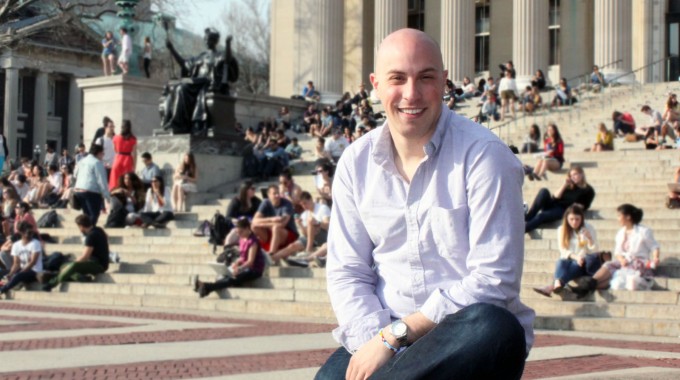If you know of a Columbia College student, faculty member, alumnus/alumna or program we should spotlight, or if you would like to submit a story, please contact:
Columbia College
Office of Communications
cc-comms@columbia.edu

Eric Kutscher CC ’13 merged his interests in Africa and sexual health through his study abroad and internship experiences at the College
Eric Kutscher ’13 was struggling with how to integrate his loves of biology, health, humanities and human sciences until he studied sexual health in Africa during his junior year.
In Kenya, Kutscher, a history major with a concentration in African studies from Westchester, lived with a family, studied Swahili and conducted field research on male circumcision and HIV risk in the Luo tribe. For the project, he walked throughout Kisumu, a city on Lake Victoria, discussing the perceptions of circumcision with male residents and conducting surveys.
“Circumcision is against the Luo culture, but western campaigns funding male circumcision there have been very successful,” he said. “I wanted to find out exactly why so many men were lining up to get circumcised.”
Kutscher discovered that Luo men believe circumcision leads to more pleasure, but that it also increases condom use, lowering HIV/AIDS risk. The project showed Kutscher that he could merge the social and biological sciences and led to a dream: getting an M.D. and an M.P.H., then starting an HIV/AIDS clinic in New York City.
Kutscher ascribes his interest in Africa to two classes he took to satisfy the Global Core requirement: “Major Debates in the Study of Africa” and “Africa in Cinema.” His interest in sexual health was more personal: In 2011, Kutscher was rejected from donating blood in New York City because he identified as a gay male.
“After this incident, I became fascinated by the public health policies around AIDS,” he said. “It got me really interested in the idea of ‘acceptable risk,’ or the idea that society decides what risks are acceptable or unacceptable to take, then makes policies based off this.”
Kutscher honed this interest during his junior year through classes at the Mailman School of Public Health. He also participated in The Hertog Global Strategy Initiative, a summer program in the history department that in 2011 focused on “The History and Future of Pandemic Threats and Global Public Health.”
The following summer, after returning from Kenya, Kutscher interned in the policy department of Gay Men’s Health Crisis, but he missed the interaction with patients that he had in Kenya and realized his interests would be best applied as a doctor. So just six days after graduation, he will start at Goucher College’s one-year Post-Baccalaureate Premed Program. From there, he hopes to attend medical school to study infectious disease and open his clinic.
“What I would want to be unique about my clinic is the quality of care. By mixing a private infectious disease practice where patients receive top-notch care with a general STI and HIV clinic, I think the ease in which someone can come to one place and get everything done will increase,” he said. “Likewise, it brings people from all backgrounds to the same center for testing and care, decreasing the stigma against HIV/AIDS.”
Even in his final College days, Kutscher is not taking time off. He volunteers as a peer advocate at Columbia’s Gay Health Advocacy Project and as an HIV tester and counselor at Gay Men’s Health Crisis. He also recently completed his senior thesis on the history of public policy and gay bathhouses in San Francisco and New York City, for which he received the history department’s Garrett Mattingly Prize.
And despite his plan to go into medicine, he hopes to still keep a hand in the social sciences.
“I’ve loved my entire senior thesis experience,” he said. “I hope to continue learning about the historical side of public health as a hobby after graduation.”
- Stella Girkins CC ’15